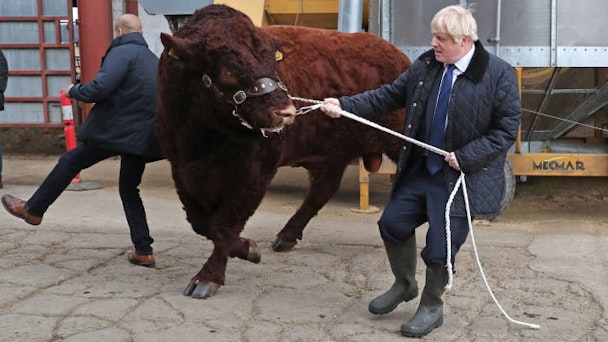A crisis comms strategy that goes against every PR instinct – can brand Boris survive?
From a PR perspective, the last few weeks have been some of the worst in comms history. But will the Teflon PM shake this stickiest of situations off? Jane Austin, founder of Persuasion Communications, takes a look.

Can brand Boris survive Partygate?
It’s hard to make any predictions as to whether Boris Johnson will go anytime soon and how that should be PRed, because our beleaguered Prime Minister is famed for brazening out failures and downright disasters that would sink anyone else in the political sphere.
Prior to Partygate, he’d already PRed away numerous bullets without any sense of shame when it came to his racist and homophobic remarks, allegations of multiple affairs (never mind his failure to declare how many children he actually has) and police visits over domestic spats. However, as anyone who uses a non-stick frying pan knows, as soon as one nick is inflicted, the rust starts to spread and the pan is soon rendered useless.
Back to more recent events: one of Whitehall’s more respected civil servants refers to his crisis communications strategy as similar to that of a farmer who discovers his cow has, alas, fallen in a ditch. Step one is to acknowledge that, yes, the cow is indeed in the ditch – and then get the cow out of the ditch. Step two is to work out how our bovine friend stumbled into said depression. Step three is to make sure future cows don’t make it into any future ditches. Which is all quite tricky when the cow refuses to accept any responsibility for falling in the ditch, and the cow is now a victim, so wants our pity, because all these horrible things are being done to him.
Unfortunately Boris Johnson’s PR strategy over recent weeks appears to have been based on a slightly different understanding of the tale: that if you simply pretend the cow isn’t in the ditch, people will give up asking about the cow.
Make no mistake about it: from a communications perspective, the last few weeks have been amongst the worst anybody in politics can remember. So what could have happened instead?
Open and honest
The great British public forgive everything other than hypocrisy and cover-ups, so it was always going to be grim reading when these Downing Street party revelations made the papers. But Johnson’s first error was made at the start of December, at Prime Minister’s Questions. Rather than taking responsibility for his team having a ‘wine and cheese’ party in December, he threw them under the bus.
“I can understand how infuriating it must be to think that the people who have been setting the rules have not been following the rules, because I was also furious to see that clip,” he said.
Try this instead: “In what was a deeply stressful situation, my team made light of lockdown measures. It was unacceptable, and those involved have been spoken to. The buck, though, stops with me: and I’m sorry. I know how hard lockdown was on everybody, and amidst the stress of the situation, mistakes were made, and I’m sorry.”
Acting like a spectator to events in his own office made the PM look not just shifty but hopelessly unaware of what was going on under his own roof. That the only person to lose their job as a result was a woman – an understandably very upset Allegra Stratton – doesn’t do much for the suspicions of a boys’ club at Number 10.
At that point at the start of December, the failure to recognize that the media would notice the cows in the ditch – and the cows’ attempts to blame others below them – would lead directly to the chaos of the new year.
Message discipline
And that chaos is made worse by the lack of clear communication by Downing Street about what, precisely, it is that Boris Johnson is trying to do. People in Westminster struggle to define Johnsonianism, beyond that it involves Boris being in charge. And down that path lies trouble.
When Cabinet colleagues attempted to drum up backbench support for the Prime Minister after his eventual apology, they were forced to cite previous achievements. Priti Patel sent a message to MPs: “Thanks to Boris’ majority the work of this Government is so extensive, we continue to bring forward some of the biggest reforms in decades to Level Up – to the NHS, asylum system, housing and more.”
Priti Patel may be convinced, but backbenchers aren’t. The lack of direction from the PM beyond the repetition of the phrase “levelling up” means that no momentum is ever built up when Borisian scandals pop up. City A.M. compared Johnson last week to a toddler cycling too slowly; meaning that the slightest pothole or bump in the road can throw him off. With momentum, a destination and some speed, even the most inexperienced cyclist can usually recover their stability.
The great reset
Johnson’s response to Partygate so far has been to leak details of plans to renew his top team. That’s all well and good, but it’s a sop to backbenchers who have never been overly keen on Number 10.
If Johnson really wants to put partying behind him, he needs to put something in front of the country that they like. He needs, in short, his own ‘global race’ – the concept introduced to British politics by George Osborne and David Cameron, which served as the underpinning of what was a successful run at the 2015 election. Levelling up won’t keep Brand Boris in No 10. Something to think about over a drink at the next work event, Prime Minister – because if you don’t think of something, Rishi Sunak or Lynn Truss might just do so.
But I just want them out, so if the Labour Party wants to hire me, it can have mates’ rates.
